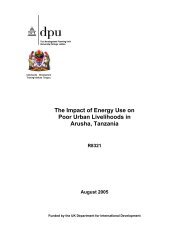EPA Review Annex Documents - DFID
EPA Review Annex Documents - DFID
EPA Review Annex Documents - DFID
You also want an ePaper? Increase the reach of your titles
YUMPU automatically turns print PDFs into web optimized ePapers that Google loves.
implementing different tariff schedules. In addition, the signing of interim agreements by<br />
only some members of some regional grouping has created some tension, as<br />
manifested in the Ethiopian case study. Nevertheless, it would not be reasonable to<br />
associate these tensions uniquely to the <strong>EPA</strong> process. More likely, the <strong>EPA</strong> experience<br />
only shows the serious underlying problems in some regional groupings to credibly<br />
implement their regional commitments and advance in their regional integration<br />
processes.<br />
Cost-benefit analysis of counterfactual options<br />
This is perhaps one of the most important elements of the study, since an intensive use<br />
of resources would be justified in the case of the <strong>EPA</strong>s bringing about large benefits.<br />
The analysis of the case studies gives us a diverse picture. For the case of the D.R.<br />
there are clear benefits of <strong>EPA</strong>s as compared to GSP. This is due to loss of preferences<br />
in GSP in key products and benefits from trade creation in an economy where trade<br />
diversion and revenue loss has been minimised with the DR-CAFTA.<br />
In the case of Nigeria, GSP+ could have provided additional market access at almost<br />
zero costs of negotiation and negligible adjustment costs. However, it has been rejected<br />
twice. In addition, due to its large tariff barriers, there are potential large benefits from<br />
domestic liberalisation and trade creation under <strong>EPA</strong> that would probably outweigh the<br />
adjustment costs.<br />
The analysis for Ethiopia is clearly different. While EBA guarantees full coverage of<br />
exports at zero costs of negotiation, more than $1.2 million has been spent of<br />
negotiating <strong>EPA</strong>s with uncertain outcome. Trade diversion and adjustment costs are<br />
likely to be large if implementing the <strong>EPA</strong>s. This implies that EBA could be a better<br />
option for Ethiopia in economic terms. However, binding development finance for supply<br />
constraints and adjustment within an <strong>EPA</strong> agreement and commitments on services<br />
could make <strong>EPA</strong>s an option with larger benefits.<br />
Perceptions on trade and non-trade related content of the <strong>EPA</strong>s<br />
It is clear from the case studies that for Ethiopia and Nigeria their main objective during<br />
the negotiations have been binding funding for adjustment and enhancing supply<br />
capacity. While this objective may be justified, it is quite striking the perception that<br />
<strong>EPA</strong>s and other trade related issues will not bring any significant additional benefits in<br />
specific areas. For example, there is a clear lack of interest on services liberalisation,<br />
mainly due to defensive reasons. Despite the broader scope for <strong>EPA</strong>s, including binding<br />
funds in the agreements remains as the most important issue to conclude an agreement.<br />
Staff incentives<br />
Without doubting about the commitment of trade negotiators towards defending their<br />
own policy objectives, it is worrying the financial incentive problems that per diems<br />
introduce. The average salary of ministry staff involved in negotiations in Ethiopia and<br />
Nigeria is around $400, while per diem where estimated in around $70 or $200<br />
depending on whether the hotel was included. This creates a large financial incentive for<br />
travelling to negotiations or training courses, which may be reinforced in the case of<br />
<strong>EPA</strong>s when negotiations are so travel intensive.<br />
85
















